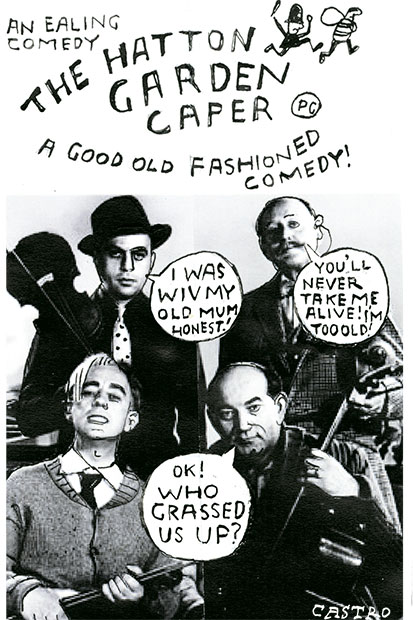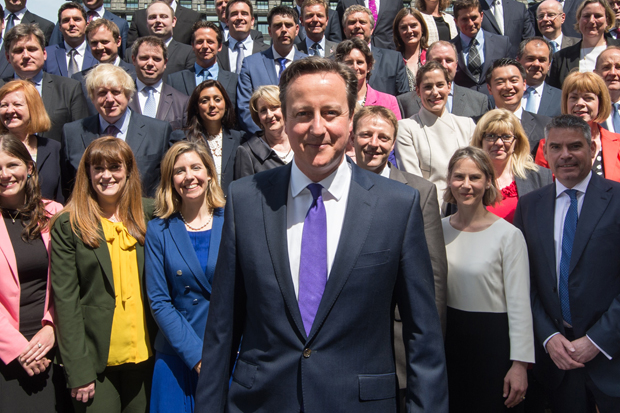Listen
In ancient Rome, when a general rode in triumph through the city, a slave would stand behind him whispering into his ear, ‘Remember you are mortal.’ Today, there is no shortage of people volunteering to make the same point to David Cameron.
First, there are Tory backbenchers with long-standing grudges who are already making clear their desire to cause trouble. David Davis, the man Cameron defeated in the leadership contest a decade ago, didn’t even wait to be sworn in again as an MP before he started warning of rows to come over plans set out in the Tory manifesto to limit the powers of the European Court of Human Rights. Then, there are the commentators who are keen to say that this is a rerun of 1992, and that once again a Tory prime minister with a small majority will be tortured by his Eurosceptic rebels.
But unlike most victorious generals Cameron has avoided being overly triumphalist. Rather than some grand shake-up, his government reshuffle was a distinctly limited affair. It was designed to avoid causing any unnecessary offence in the parliamentary party and to show that there is a way back for those who have previously been sacked, passed over or rebelled. No. 10 hopes that this will make Tory MPs easier to manage in the coming months.
The first meeting of the Conservative cabinet did not descend into an orgy of desk banging either. Once the TV cameras had left, there were sombre discussions about the reality of governing with a small majority in the House of Commons and no majority at all in the House of Lords. Already, the former has led to Downing Street imposing restrictions on ministerial travel — unless you are a Foreign Office, International Development or Defence minister you are now not allowed to leave the country when Parliament is in session without the explicit permission of the Prime Minister’s Office. But the Lords problem is more complicated. The cabinet was urged to ensure that government legislation uses the same language as the Tory manifesto, that way the Salisbury Convention applies and the House of Lords will not block it.

Some senior Conservatives think that this approach underestimates how much the second chamber has changed. They argue that on issues such as the Human Rights Act the current, more activist Lords will feel entitled to obstruct the government. They believe that at the first sign of trouble from the upper house Cameron should simply appoint a sufficient number of peers to ensure that the government’s legislation can pass. But the Lords is already overcrowded. There are currently around 790 peers, there’s deep reluctance in No. 10 to nominate more than 100 new ones.
One piece of legislation that will test the government’s position in both houses is the repeal of the Human Rights Act — now the responsibility of Justice Secretary Michael Gove. This is far more complicated than it sounds as it is a component of both the Scottish devolution deal and the Good Friday agreement. When Gove was made Education Secretary in 2010, he had had years in opposition to draft the necessary legislation and was out of the blocks with a parliamentary bill before his opponents could mobilise. But that option isn’t open to him this time round: he has only just taken on the brief and the human rights industry has been preparing for this fight for years. Gove is refusing to be rushed. He wants to be entirely sure of his ground before he starts the fight. Further complicating matters is the number of Tory MPs who might oppose what he proposes. David Davis has, even those sympathetic to his cause admit, gone too early; there is something almost indecent about the haste with which he has started to make threatening noises. The worry for Gove shouldn’t be Davis but those Tory MPs with misgivings who are currently keeping them to themselves.
Dealing with the European Court of Human Rights, though, is merely the amuse bouche. The far broader issue will be EU renegotiation. Cameron’s challenge here is to negotiate a deal for Britain that is acceptable to the bulk of his party. Inside Downing Street they believe that if the government recommends an In vote, winning the referendum will be relatively easy. Cameron, though, would be wise to realise that preventing a split in the party will require a creative approach to party management. He should, for instance, allow cabinet ministers to campaign for Out, come the referendum. Such an approach would make it far less likely that the party would split over the issue. It would also demonstrate a confidence in the strength of the case that he was presenting to the public.
One consolation for Cameron is that, unlike with Maastricht, there won’t be endless parliamentary votes on the matter: the referendum will decide things one way or the other. If the public approve the new terms, it is hard to see how MPs could then seek to amend them as the treaty passed through the Commons.
Excited Tory cabinet ministers, encouraged by the Labour leadership contest, are already talking about how the party can win again in 2020. But there’s a huge challenge ahead. Cameron’s inside gang list the party’s five tasks as keeping economic growth going, getting an acceptable deal from Europe, securing the Union at home, showing that their policies benefit the poorest in society and ensuring that more houses are actually built. This would be difficult to achieve with a majority of 100, let alone with one of 12.
Got something to add? Join the discussion and comment below.
Get 10 issues for just $10
Subscribe to The Spectator Australia today for the next 10 magazine issues, plus full online access, for just $10.
You might disagree with half of it, but you’ll enjoy reading all of it. Try your first month for free, then just $2 a week for the remainder of your first year.















Comments
Don't miss out
Join the conversation with other Spectator Australia readers. Subscribe to leave a comment.
SUBSCRIBEAlready a subscriber? Log in